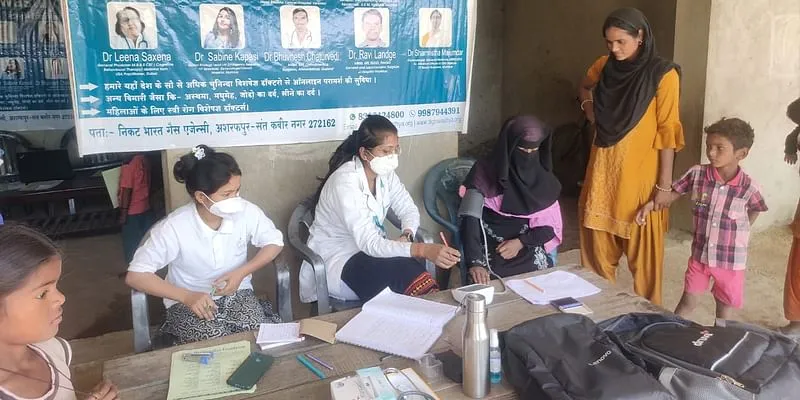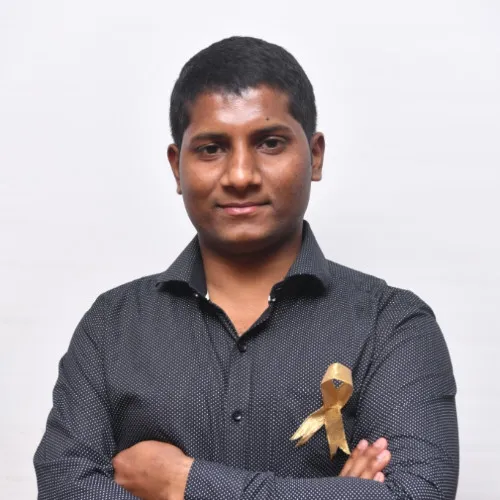This cancer survivor is giving access to healthcare in rural India through telemedicine centres
Sandeep Kumar was diagnosed with bone cancer at the age of 12. Realising that access to healthcare remains fragmented in rural India, he started DigiSwasthya, a not-for-profit that runs e-telemedicine centres, to make healthcare services affordable and accessible for rural communities.
Key Takeaways
- Sandeep Kumar was diagnosed with Ewing sarcoma when he was 12 years old
- He worked with different NGOs to help cancer patients and their families
- He founded DigiSwasthya to bring healthcare services to the underserved
- It has served over 21,300 patients with 115 healthcare professionals on board
When Sandeep Kumar was 12-years-old, he was diagnosed with Ewing Sarcoma, a type of bone cancer. It took several rounds of district and city hospitals over a span of six months to get the right diagnosis and start treatment.
Kumar hails from Kathaicha, a rural village in Sant Kabir Nagar district in Uttar Pradesh. Growing up, the lack of access to efficient healthcare in the village meant that people had to travel almost 65 km to Gorakhpur, the nearest city for specialised treatment.

DigiSwasthya's telemedicine centre
Seventeen years after his diagnosis and recovery, things had not changed much in his village. This led Kumar to start DigiSwasthya Foundation, a not-for-profit organisation, in 2020. It offers a full stack of healthcare services via five telemedicine centres, awareness camps, and referral pathways to the remotest parts of India.
Battling cancer and after
To understand the genesis of DigiSwasthya, is to understand Kumar’s battle with the disease, his recovery, and his mission to provide healthcare to the underserved parts of the country.
“When I was 12, a part of my right hand began to swell and there was a tumour like growth. I was afraid to tell my parents and did so only when I could no longer bear the pain. I got quite a scolding for not informing them earlier,” he tells SocialStory.
When home remedies didn’t work, the family took Kumar to the local doctor in the district hospital in Basti, Uttar Pradesh, and for six months, there was no diagnosis. They met a couple of doctors in Gorakhpur, one of whom ordered a biopsy where it was found that he had a cancer in the right humerus bone.
The next day itself, they travelled to Mumbai to seek further treatment at the Tata Cancer Memorial Hospital. Kumar says, initially, as a starry-eyed kid, on a dose of Bollywood, he was excited about the visit.
“Things started getting painful and one month was passed in a battery of tests, a biopsy, and six chemotherapy cycles. I had to undergo a surgery for replacement of the humerus bone. The process was draining–I was feeling angry, resignation, and grief, and wondered whether I would recover,” he says of the ordeal.
The treatment cost Rs 4.5 lakh and Kumar says he was fortunate to receive help from government agencies, NGOs, and support from friends and family.
It took six months of physiotherapy for him to regain movement of his right hand. And throughout this period, and even though he was young at the time, what played in his mind after seeing the helplessness of many patients was how he could help them in the future.
He continued his education without much interruption–he holds an MA in Sociology, a master’s in social work, a certification from Tata Institute of Social Sciences and a PG Diploma from the Indian School of Development Management.
“I began working with different NGOs like V Care Foundation, Access Life Foundation, CanKids KidsCan and others, visiting big hospitals like Tata Memorial Cancer Centre, Sion Hospital, Wadia Hospital, visiting patients who came from all over India and provided them with information about accommodation, food, treatment so that they don’t feel alone in their struggle,” he says.
Kumar also founded a support group of childhood cancer survivors visiting hospitals to share their stories of fighting the disease and the recovery process.
Healthcare for the underserved

Sandeep Kumar
In 2019, he was visiting his village when the country went into lockdown. He perceived things had not changed much the healthcare system remained fragmented, and people still found it difficult to access specialists or specialised care.
“I spoke to the doctors at different hospitals I had frequented as part of my work, a few technical experts and with advice from the district Chief Medical Officer (CMO) and started a telemedicine centre in Sant Kabir Nagar under the DigiSwasthya Foundation,” he says.
Initially, Kumar facilitated telephone and video-calling to experts from his own home and then moved it to a 200x200 sq. ft centre in the village.
Half the centre is partitioned for the patient to have the privacy of talking to doctors via a big screen. The other half of the centre is manned by nurses who check the vitals of the patient and records the history of the patient.
Following the success of the first centre, Kumar opened another one in the same district, one in Muzaffarpur, Bihar, and two in Maharashtra; in Palghar and Tekwadi.
“People were sceptical at first about reaching out to doctors via video calls. They wondered what kind of consultation it was without injections or talking to the doctor in person. I was able to convince them that they now had access to some of the best doctors from the top hospitals in the country,” he adds.
Kumar has on board doctors from Tier-I city hospitals like Apollo Hospital, Tata Cancer Memorial Centre, JJ Hospital, Wadia Hospital, KEM Hospital, Lilavati Hospital, Sion Hospital, and others. Some doctors charge a nominal fee from the clinic while others work pro bono. No fee is charged from the patients.
Moreover, the doctors are also available for follow-up consultations, and DigiSwasthya helps patients with referrals to hospitals, and in dire cases, financial help for treatment. Patients are also offered 59% discount in the diagnostic labs and medical stores the organization has partnered with.
Along with the tele-medicine centres, the DigiSwasthya team travels from village to village with educational material and teaches rural households how they can avail of affordable and accessible services through DigiSwasthya telemedicine centres.
So far, the foundation has served over 21,300 patients with 115 healthcare professionals on board. It has conducted 594+ health awareness and teleconsultation camps across India. It has impacted 6,50,000 beneficiaries directly or indirectly. It runs with a team of 22 staff, of which 17 work full-time and five are interns.
Kumar says raising funds has been the biggest challenge so far. In the first year, he used all his savings to start the centre. He has now started raising money from CSR funds, high-networth individuals (HNIs), and from friends and family who believe in the cause.
“It’s heartening to see people unhesitant to visit the centres. Earlier, women were reluctant to share their problems with the doctors. Now, they are open to visiting the centres and talking openly to the doctors,” he says.
Now, his plan is to facilitate a specialist’s visit once a month in each of the centres. His goal is to also open 100 telemedicine centres in remote areas of the country.
(The story has been updated to add more academic qualifications.)
Edited by Megha Reddy






